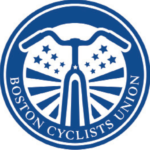Welcome to the Boston Cyclists' Union!
The Boston Cyclists’ Union is a new advocacy organization focused within the boundaries of the city of Boston. Our mission is to promote the everyday use of bicycles by advocating for safe, convenient, and enjoyable cycling facilities in all of Boston’s neighborhoods.
The BCU began in January 2010 as a meeting between 20 bike advocates from nine different Boston neighborhoods. We agreed that our mission includes safety, but also equity. Before BCU director Pete Stidman’s advocacy for a bike lane on Talbot Avenue while at the Dorchester Environmental Health Coalition, the City of Boston had no plans for any bike safety infrastructure in neighborhoods of color.
With the founding of the BCU, advocacy for safely designed bike lanes was continued on Blue Hill Avenue, and expanded to include three other streets in Roxbury and Dorchester: Columbia Road, Warren Street, and Martin Luther King Boulevard. The city has been very responsive to our requests, and we have worked with a number of neighborhood groups and institutions to show clear community support, such as the Mattapan Food and Fitness Coalition, the Codman Square Health Center, and the Haitian American Public Health Initiative.
We are also involved in improving the outcomes of road improvement projects, bike parking facilities, and design processes in Jamaica Plain and Allston including successfully influencing the city to change the design of Western Avenue in Boston from a class 2 bike lane to class 1 separated bike lane, otherwise known as a cycletrack.
Our method is not to dictate proper design techniques, but to give tools and direct help to cycling advocates who already live in Boston’s neighborhoods. This includes the established neighborhood bike groups DotBike, JP Bikes, and Rozzie Bikes, and also individuals in several other neighborhoods. We invite you to get involved by signing up for our newsletter or emailing us (see “contact us” link) to volunteer.
We believe our city has enormous potential to become America’s premier “Cycling City.” Boston is the country’s fourth densest city by population, it is relatively flat, and as of 2010, 13 percent of Bostonians were walking to work. With a connective network of safe and convenient bike lanes, paths, and cycletracks, Boston could become the first major American city to boast cycling rates comparable to Europe’s bike-friendliest metropolises.
This vision of a higher quality of life and healthier streets extends, and should be implemented, in every neighborhood. Bringing “complete streets” infrastructure, traffic calming, and networks of safe on- and off-street bikeways to everyone is a reliable and proven way to improve cardiovascular health and prevent obesity. Boston can become a place where children bike to school without fear, where businesswomen bike to work in power suits and high heels with peace of mind, and elders pedal safely through our streets, breathing cleaner air and staying fit.

